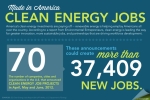An overview of the concept behind The Solarize Guidebook, which offers neighborhoods a plan for getting volume discounts when making group purchases of rooftop solar energy systems.
Across the country, solar installations are in demand. Still -- despite increasing popularity among American homeowners and businesses -- if you’re a condo owner or a renter, a solar energy system may seem an unsuitable option. This perception is changing, however, with the rise of community shared solar energy projects.
By adopting community shared solar energy projects -- condo owners, renters, and those whose rooftops are not suitable for solar can band together to participate in a collective photovoltaic system. Here’s the basic premise: a community joins together to purchase a solar energy system -- collectively choosing the contractor and location for the installation. Each community owner gets a share of the power generated by the solar energy system, a credit on their utility bill, or other financial benefit.
If you’re interested in learning more -- check out two updated guides, from the Energy Department, on community shared solar installations:
A Guide to Community Shared Solar explores a range of incentives for community shared solar projects and highlights best practices. The guide is organized around three sponsorship models: utility-sponsored projects, projects sponsored by businesses formed for the purpose of producing community solar power, and nonprofit-sponsored projects. The document discusses what each model has in common, and what is unique.
The Solarize Guidebook offers neighborhoods a plan for making group purchases of rooftop solar through a coordinated program. This type of purchasing allows neighborhoods to buy hardware for a solar installation at lower prices and, in turn, pass these savings onto their communities. The guidebook provides a roadmap for project planners and solar advocates who want to convert interest into action, break through market barriers, and permanently transform the market for residential solar installations in their communities. The guidebook also details the original and wildly successful Solarize campaign in Portland, Oregon, and offers program refinements from other solar projects based on that model. Drawing on actual experiences, The Solarize Guidebook provides lessons, considerations, and step-by-step plans for project organizers to replicate successes in Portland, such as boiling down the many choices to "yes-no" decisions for consumers. Over the last three years, this approach has helped Portland add more than 1.7 megawatts of distributed photovoltaics while establishing a strong solar installation economy.
Both how-to manuals highlight different approaches to increasing access to solar energy and to reducing upfront costs for participants. Find out which option might be best for you -- and your neighbors.



